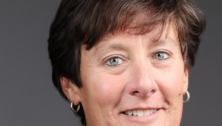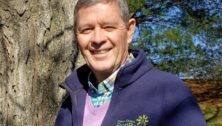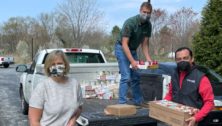Chester County Leadership: Andrea Youndt, CEO, Chester County Food Bank
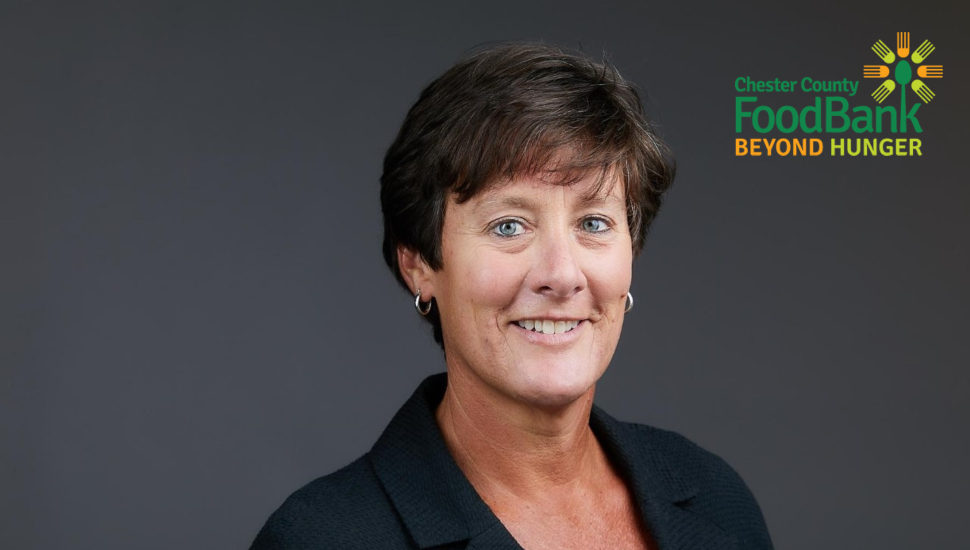
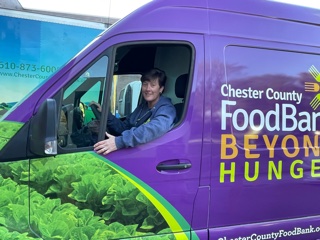
Andrea Youndt, the Chester County Food Bank’s CEO, spoke with VISTA.Today about growing up in a small town in Lancaster County, the lesson about work she ultimately learned from wanting to buy a pair of Nikes instead of cheaper sneakers, how her Type A personality helped her athletically and professionally, and how much she enjoys being a part of a team and helping team members realize and achieve their potential.
Youndt also discussed her experiences as a student-athlete at the University of Delaware, the 20 years she spent with the YMCA, what brought her to the Chester County Food Bank, and the challenges that lie ahead for the county’s central hunger-relief organization.
Where were you born, and where did you grow up, Andrea?
I was born the oldest of two girls in the Reading Hospital and grew up in Adamstown in Lancaster County. It was a great place to grow up, it has one traffic light if that gives you any idea of its size. My grandparents on both sides lived there, and my sister still lives there today.
My parents were high school sweethearts and had me at a very young age. My father was in college when I was born, and my mother completed one year of college before leaving to raise her family.
We lived with my grandparents for the first three years of my life. As a result, my grandparents were extremely influential in my life.
What did your parents do?
My father worked for Aetna Life & Casualty Insurance for over 20 years and then for ICF in Harrisburg for 25 years, he retired in November and passed away in December.
My mom spent most of her career working in various administrative roles for a local municipality, Spotts, Stephens, and McCoy in Reading, and the Ronald McDonald House in Hershey. She also volunteered with me at almost every place I’ve worked. These days, she splits her time between Cape May and Savannah, Georgia with her husband of more than 35 years.
What memories of growing up in Adamstown stay with you today?
My grandfather was the COO of the Bollman Hat factory in Adamstown. Back in the 1970s, Bollman was the largest wool felt hat factory in the world. One of my earliest memories is going to the factory and walking around with my grandfather. I loved to see the wool come off the truck onto the conveyor belt.
The Bollman Hat factory built a community pool in Adamstown so everyone could learn to swim and enjoy the summer. My grandfather had a cousin drown in front of him at the beach, so water safety is important to our family. My family is extremely focused on water safety and teaching people to swim. At one point my grandmother, mother and my sister and I were all teaching swim lessons to kids and adults in our community.
You mentioned working at the swim club, what other jobs did you have growing up?
My first job was working in the snack bar at the pool, then as the lifeguard, swim instructor, and swim coach. When the pool closed at 8:00 p.m. I would walk up the street and work the food line at the beer fest, which is now Stoudt’s Brewery. I also worked at Sears and the Denver Nursing Home as summer jobs to pay for college.
Did your parents expect you to work?
Yes, it was expected that we would contribute at home, and if we wanted “things” we would need to earn money to buy them. I remember wanting to buy a pair of Nike sneakers vs. K-Mart brand and I was very motivated to earn enough to buy them. When I was about 10, my sister and I had a chores chart, and we got 5 and 10 cents for certain chores and got paid at the end of the week, it was our snack bar money for the pool.
What do you think those jobs taught you that you still use on a day-to-day basis?
Accountability and time management. When I’m tasked with something, I always try to do it to the best of my ability. My parents would assign us something to do and check to make sure it was done and done well. If it didn’t measure up I’d have to do it again and that was a waste of time, so I learned early to do things right the first time.
You mentioned coaching. How old were you when you started that?
I was fifteen-years-old
Did coaching come easy to you?
I enjoyed coaching and seeing the success of others. My first experience was with the youngest swimmers on the team, and watching a 5-year-old swim a lap of the pool and finish with a smile was rewarding. Come easy? Well, I think anytime you help people feel better about themselves and overcome an obstacle or learn a new skill it’s fulfilling, so that’s my approach. I enjoy the team environment whether I’m the coach or the player, I like the team to be successful and for each player to feel they’ve contributed to that success.
Where does that insistence on order and process come from?
It’s a family thing. I was surrounded by a lot of Type-A’s in my family. It’s about time, everything revolves around efficiency so there is more “time” to do more. Evaluating systems and processes or logistics is fun for me and it’s really just how I look at things, good or bad. I enjoy finding the most efficient and effective way to do something and that has paid off for me during my career. Employers and bosses like when productivity is good and I was good at doing more with less or maximizing resources, human and otherwise.
You mentioned field hockey and swimming. Any other sports?
I played basketball, volleyball, and softball, so I was playing multiple sports year-round, I enjoy being active.
Which sport did you enjoy the most?
Basketball competitively, swimming for life. When you’re firing on all cylinders as a team, basketball is the most fun. In high school, my best friend scored over 1000 points and I was excited to contribute by getting her the ball, again it’s about the team, I was happy to be #2. I could take a shot, but I would pass it off to her for a better shot with a higher scoring percentage.
Where did you end up going to college?
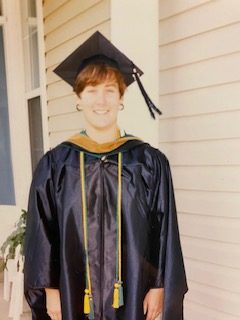
I went to the University of Delaware in 1983. I passed up a field hockey scholarship at Brown to study biology. I wanted to go to a Division 1 school, with athletic training, that was reputable and had the environment I was looking for. I liked William and Mary, and the University of Delaware had a similar vibe but was closer to home and more affordable.
I ended up playing field hockey at U of D but only for a year. I was majoring in Athletic Training and Sports Medicine, which required a heavy course load and practical hours in the training room over four years. I couldn’t afford to pay for a fifth year if I wanted to play and study.
If you had to do it again, would you have gone to Delaware?
Yes, but I would have majored in Marine Biology like I originally intended. In the end, Delaware helped me get to where I am today, but I think I just would have done a few things differently along the way.
Who were the people who saw potential and opened doors for you?
When I was at Delaware and going through the athletic training program, Dr. Roy Rylander was in charge of the program. He’s a legacy and it was amazing to gain experience with him. Back then, as a woman trainer, I didn’t really have a path to a job while men could get a job easily with professional sports team, so coming out of Delaware I needed a plan.
I wasn’t exactly sure what I was going to do so I began applying to Physical Therapy schools. What I found was I needed practical, on-the-job experience to apply, which was a bit challenging and seemed a little backwards.
Eventually, I found a position as a hydrotherapy aide at the Mary Campbell Center in Wilmington working at a residential center with individuals with intellectual and physical challenges for $5.85 an hour.
I figured I would start there and get some experience before moving on. Jerry Spilecki was the Executive Director and he was a good mentor and teacher. Jerry allowed me to use my creativity and try new things and had faith in me. It was an amazing place and I met a tremendous group of caring people. Ironically, I was there for thirteen years.
My plan of going to physical therapy school morphed into going back to school for my Master’s degree in Human Resource Management because I was supervising half the departments at Mary Campbell Center when I was twenty-five-years old. I went from the pool Hydrotherapy Aid to the Assistance Aquatic Director in six months. From there, I was the Director of Aquatics in one year. I was the Director of all physical development, which was physical therapy, occupational therapy, speech therapy, education, transportation and aquatics after my third year.
Everywhere you go, you just shoot to the top.
I don’t know if I “shoot.” It’s more like crawl to the top. I try to excel in areas that I was in. I’m a good team player. I try to make things better.
Who else saw promise in you, Andrea?
When I left the Mary Campbell Center, I wanted to find a career path that aligned with my professional aspirations and personal interests. That was one of those moments where I had to ask myself, “what do I want to do and where am I going?” I focused on what I knew I was good at and went to the YMCA as an Aquatic Director, I took a bit of a step back to take eventual steps forward.
The YMCA of Philadelphia was building a new facility, Rocky Run, on Route 1 just west of Media, and I knew I wanted to create my own Aquatic Program from the ground up. I got to be part of planning, construction and opening a brand-new YMCA.
At that time, Kevin Padrnos was the Executive Director of the YMCA and he hired me but said I was over qualified and asked if I would agree to stay for 3 years. I assured him I wanted the job, not because I needed one, but because I wanted to be a part of a new YMCA. I ended up working with the YMCA of Philadelphia for ten years.
My goal was to be the Executive Director in five years, which came true. When John Flynn came to Philadelphia, Rocky Run YMCA was the signature YMCA. We were serving the community and doing a lot of great outreach in Chester. He asked me to be a District Vice President. I kept my branch and supervised three other branches to bring consistency and quality across the organization.
At a regional YMCA event in Harrisburg, Gary Green, who was the CEO of the YMCA of the Brandywine Valley told me he was retiring soon and suggested I apply for the soon-to-be vacant COO job. He was retiring and promoting his COO to CEO. I figured why not. I ended up being with the YMCA movement for twenty years.
What brought you to the Chester County Food Bank?
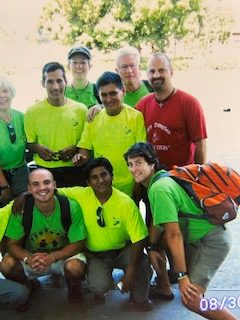
I feel like I had been preparing for this job at the CCFB my entire life. In 2002 I had the opportunity to go to Peru on a mission trip to build beds and deliver them to impoverished people. The trip was life-changing for me. To see that type of poverty and despair was unlike anything I had ever experienced.
19 years later, I’m still doing it. The first group of kids I met and found sponsors to support have graduated from college, without the support many would not have finished the 8th grade.
Having been a COO for a large non-profit and after completing a CEO preparatory course I was looking for opportunities in my community to lead a non-profit with a meaningful mission. The CEO position at the Chester County Food Bank became available, and the rest is history.
What is the mission of the Chester County Food Bank?
Our mission is to mobilize our community to ensure access to real, healthy food. We know that Chester County is the wealthiest county in Pennsylvania. We know there are appropriate resources to solve the problem if we all work together and stop competing for resources and work collaboratively.
The greatest challenge is affordable housing and the fiscal cliff many of our residents face each day. Over 9% of our community is food insecure and much is due to the high cost of living. At the CCFB we are working to provide equitable access to food with over 150 agency partners, through mobile markets, choice pantries and a nutritional framework. We are proud that 50% of the food we distribute is fresh, local produce. No one should have to receive food in a box and have no option for what is in the box.
Given Chester County’s affluence, what is the need for the food bank
Right now, the population in Chester County that is food insecure has gone up from 6.3% to 9.8% over the last year. Before COVID, the Food Bank served about 45,000 people. There are also people who need food but who are too proud to ask for it.
As our mission states, we need the community to continue to mobilize and support us so we can support the local pantries and cupboards. The need isn’t going to go away and we rely 100% on the generosity of our community so that we can assure access with choice and dignity.
What surprised you about the Food Bank?
The scope in terms of the number of the organizations we work with as well as the Food Bank’s reach. The Food Bank is bigger than I thought. For an organization of our scope and size, we’re very agile. We have to be to meet the changing needs of the organizations and people we serve.
Looking forward, what are your challenges and priorities you’re focused on, Andrea?
My top priority is to make sure we have a strong foundation on which to continue our mission. Sustainability, assure we have the right resources and structure in place to be the best partner we can be and be a leader or team player around the key topics of social justice.
I’m also focused on improving communication with our partners and automating our processes to increase efficiencies so we can get quality food to more people, faster.
What is the Food Bank’s greatest asset?
Our dedicated, professional, passionate staff and our reputation. A reputation of being a true community partner and collaborator. We’ve always stepped up and we come to the table whenever we’re asked. Our history is an asset, strong leadership from our Board and dedication from our amazing staff team, what more could you ask? People can count on us. We are dependable and we will get the job done. Through COVID, they didn’t miss a step. Even though volunteer support was limited, they figured it out.
What worries you the most?
Having enough resources to meet the needs of our community. Food insecurity has been brought to the forefront for everyone. It’s been in the news. A lot of people have jumped into what I call the “food game.” They’ll jump out as soon as the crisis passes. There’s a false sense of security with resources right now. It’s hard to predict what level of support will come from government, corporations and individuals as the pandemic subsides but the need continues. We had a large need before and we are going to ask for the support to remain and my worry is the gap that could occur.
Are you up for the challenge?
Yes! The experiences that I’ve had and the challenges that I’ve faced have prepared me to stay focused and unwavering. It’s also been energizing working with Bob McNeil and the other members of the Chester County Food Bank Board. They are dedicated to the Food Bank’s mission to ensure all Chester County residents have access to real, healthy food.
What do you do in your spare time?
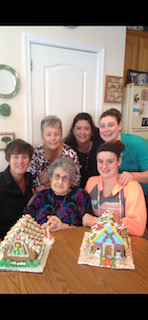
I enjoy hiking, being outdoors, spending time with family and friends and quality time with my dog Buckley. I enjoy traveling to new places, snorkeling, exploring and being anywhere there is crystal blue water. I love the beach and get down to Cape May often. We have a beach house there and my mom and her husband have a home there, so I’m looking forward to seeing her this summer. I also enjoy spending time with my nieces.
Finally, Andrea, what was the best piece of advice you ever received?
It was given to me on a mission trip to Peru. The minister I worked with there, Solomon, would often stay up late and talk with me. His English wasn’t very good, and my Spanish was worse. Solomon was remarkable. He did so much with so little. I asked him how he was able to do what he does. He said, “As long as you’re true to your mission, everything else will follow, have faith”.
I’ve been in several leadership conversations where the question is asked “does money follow mission,” or does “mission” follow the money? If you have no mission, or you don’t lead with it as your North star, you will always be chasing money. If you stay true to your mission and do the work, you will always have the support of others, how true you are to that mission is your differentiator.
Connect With Your Community
Subscribe to stay informed!
"*" indicates required fields























![95000-1023_ACJ_BannerAd[1]](https://vista.today/wp-content/uploads/2023/03/95000-1023_ACJ_BannerAd1.jpg)





















